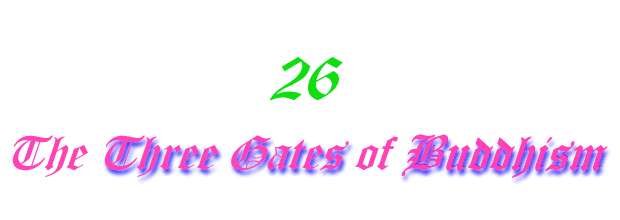|
When Lu Hsi-sheng first visited Ch'an master Yang-shan, he asked the
Master, "If the three gates of the monastery
are all open, through which one should I enter?"
"Through the Gate of Faith,"
answered the Master.
"What good are the other two?"
Hsi-sheng asked.
"You may also enter through them,"
declared the Master.
"What are they?" inquired Hsi-sheng.
"One is the Gate of Wisdom,
and the other is the Gate of Compassion," the Master replied.
"If we enter through only one, why do we
need three?" Hsi-sheng asked pointedly.
Yang-shen explained, "Those who use the
Gate of Faith enter through the Buddha, those who use the Gate of Wisdom
enter through the Dharma, and those who use the Gate of Compassion enter
through the Sangha. In other words, one may enter the Buddha's
Path by means of any one of the Gates of the Three Precious Ones."
Inside the preaching hall, Lu Hsi-sheng continued his questioning,
"What will happen if one enters the Buddha
realm without leaving the realm of the demons?"
Master Yang-shan waved his whisk upside down three times. After seeing
this, Lu Hsi-sheng prostrated and then asked, "Master,
do you still keep the precepts?"
"No!." he snapped.
"Do you still sit in meditation?"
Again the Master declared, "No!"
Lu Hsi-sheng was lost in thought. The master asked, "Do
you understand?"
"No!" he exclaimed.
Yang-shan then explained what he meant in a verse:
The enlightened person observes no precepts
even when tempted to do so,
And does not meditate even when alone.
After two or three cups of strong tea,
All subtle meanings exist alongside the hoe.
|
There is a saying: "Every road leads
to Ch'ang-an." It can equally be said that "every gate
opens onto Buddhism." The most important practices for entering
the gate leading to Buddhahood are to keep the precepts and to
sit in meditation, yet Ch'an Master Yang-shan claimed that he
did neither. Did he then desert Buddhism? No, he did not. All
precepts emphasize rules and regulations. This is because Ch'an
stresses the freedom from all bonds rather than being restrained
by forms or concepts, regardless if they are evil or pure. Hence,
Master Yang-shan, after denying all such distinctions, stated:
"After two or three cups of strong tea, All subtle meanings
exist alongside the hoe." This implies that a real Ch'an
master never strays from the middle path to either extreme, which
is the true practice.
|
(Source: Hsing Yun's Ch'an Talk, Book 3) |

